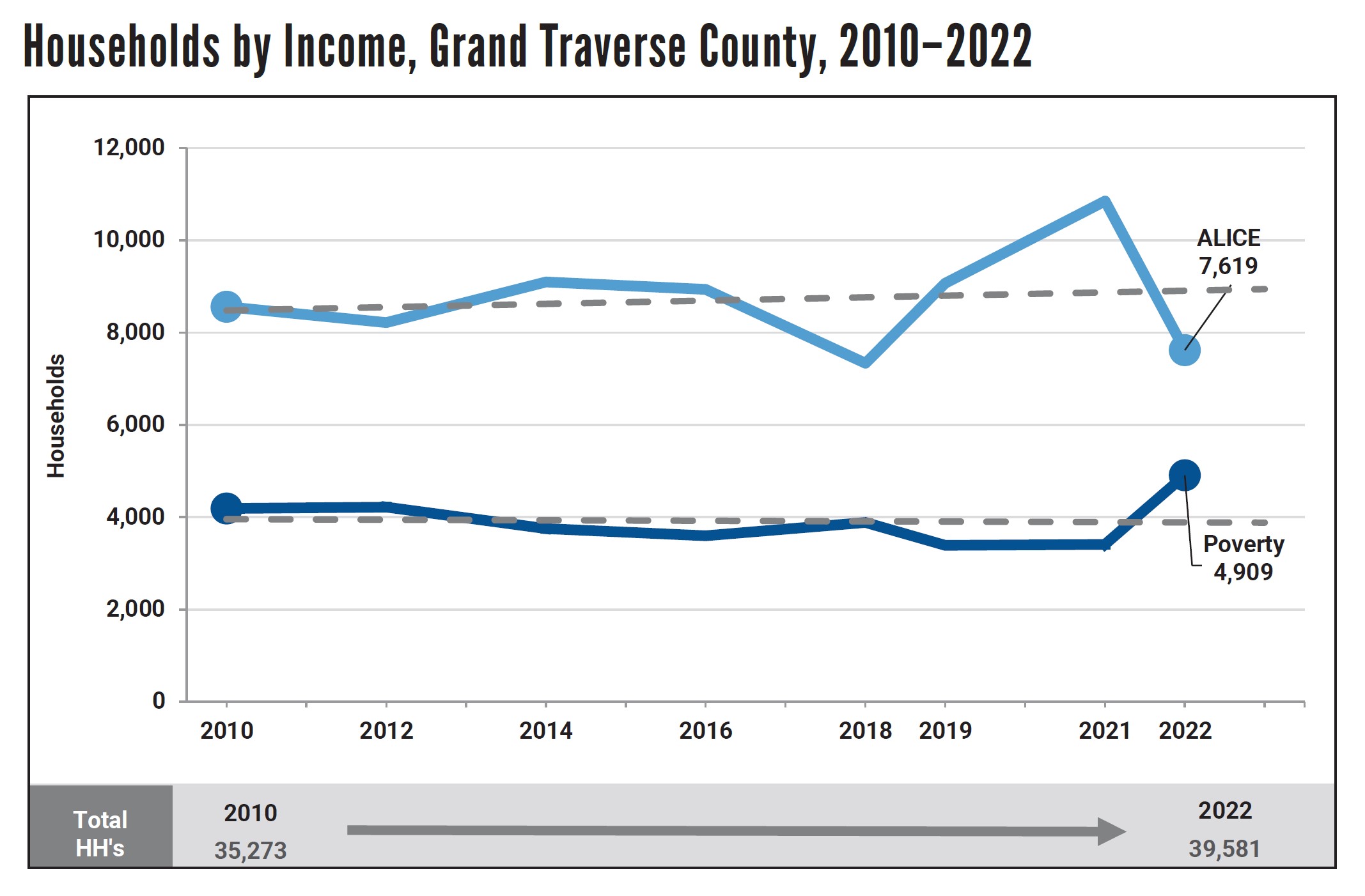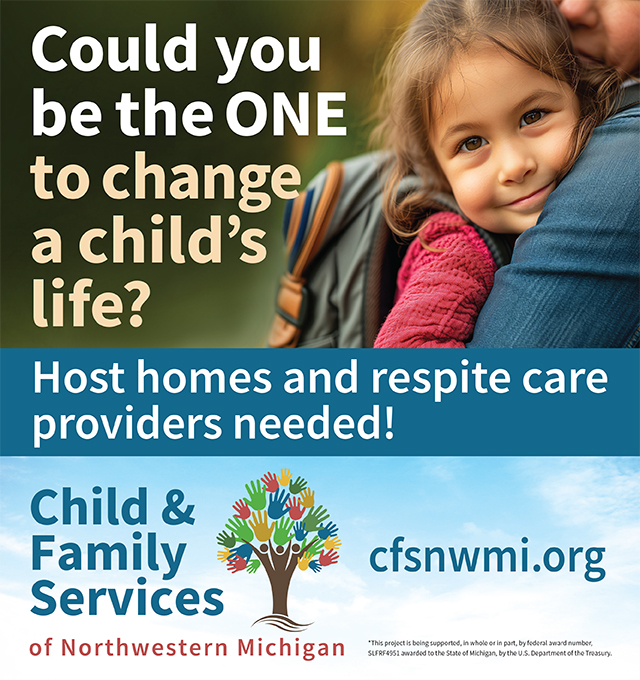
'Leaving In Droves': How Cost Of Living Is Driving People Out Of Grand Traverse County
By Craig Manning | May 26, 2024
Thirty-eight percent of households in the ten-county northwest Lower Michigan region are struggling to make ends meet, according to a new report from United Way of Northwest Michigan (UWNWMI). Across a detailed data set, the report shows how the cost of living in northern Michigan is becoming untenable – pricing families out in the process.
According to Seth Johnson, president and CEO of UWNWMI, the issue has been exacerbated in recent years by skyrocketing inflation and loss of pandemic-era safety nets. If the region’s problem with struggling households continues unabated, Johnson warns that it could spell even more trouble for employers trying to find workers, for parents hoping to access child care, for seniors attempting to subsist on fixed incomes, and more.
The report is a piece of a broader update from the Michigan Association of United Ways (MAUW), which provides annual breakdowns of households struggling throughout the state. Nationally, those types of households are most often measured based on the federal poverty line, which is based on income thresholds that vary depending on family size and composition. Using an additional measurement called ALICE (Asset Limited, Income Constrained, Employed), United Way looks at households “that earn above the federal poverty level, but not enough to afford a bare-bones household budget.” ALICE metrics take into account where families live on a state, county, and township level — and more crucially, what the cost of living is in those areas – in hopes of providing a broader and more accurate assessment of embattled households than the federal poverty measure can provide alone.
According to MAUW, “the number of households struggling to get by in Michigan grew by more than 100,000 from 2021 to 2022,” creating a situation where 1.7 million households – or 41 percent of the state population – are now “living paycheck to paycheck.”
Northern Michigan, long a lightning rod for discussions around wealth disparity and the rising cost of living, has not been spared from the trend. In the ten-county region UWNWMI services – Antrim, Benzie, Charlevoix, Emmet, Grand Traverse, Kalkaska, Leelanau, Manistee, Missaukee, and Wexford counties – 14,084 households are living in poverty, while another 35,701 fall below the ALICE threshold.
High ALICE numbers aren’t new for northern Michigan. In February 2022, Ticker sister publication the Leelanau Ticker did a deep dive on ALICE data for Leelanau County. As of 2019, only 6 percent of Leelanau’s households were living below the federal poverty line, but 43 percent were below the ALICE threshold. According to the latest data, things are getting worse. As of 2022, 4,535 of Leelanau’s 9,246 households now fall into the ALICE-plus-poverty zone, equating to 49 percent.
What does Leelanau County’s climbing ALICE number have to do with Traverse City? Everything, according to Johnson. Based on MUAW data, Grand Traverse County had 3,232 fewer ALICE households in 2022 than it did in 2021. That change looks good on paper, but Johnson says it only tells part of the story. Between 2021 and 2022, Grand Traverse County also saw a 1,498-household increase in its poverty numbers and lost 502 households overall. Those numbers, Johnson says, offer a grim takeaway: Traverse City’s ALICE population is either slipping into poverty or leaving the county behind.
“I think the standout of this data is the geographic shuffling,” Johnson tells The Ticker. “You see all this growth [of ALICE households] in neighboring counties, and I think that just shows how the cost of living in Grand Traverse County is pushing out these working families that are working lots of jobs but are just not completely financially stable. And then they're having to move farther and farther out to find affordable housing, affordable child care, things like that.”
Indeed, outside of Grand Traverse County, seven of the nine other counties in the region saw increases in ALICE households between 2021 and 2022: 349 more in Leelanau, 296 more in Benzie, 498 more in Manistee, and so on. Some of those jumps may be attributable to overall population growth, given that the region posted a net gain of 2,096 households. In the context of that overall growth, though, Johnson says it should alarm local residents that Grand Traverse County – long the “population center for the region” – is shedding households as its adjacent counties grow.
“We’re all familiar with those help wanted signs [at local businesses], and we need to be aware that more and more working families are not able to make it here,” Johnson says. “This data shows that some of those households are choosing to leave Grand Traverse County and move out to other counties, or just to leave the area in general. These are people that are working at hotels, they're working at restaurants, they're working at gas stations, they're child care workers. These are people we really need here, just to have our community be able to operate, but they're leaving the county in pretty significant droves.”
Driving the exodus is the fact that wages aren’t keeping up. According to MUAW data, the necessary “household survival budget” for a family of four in Grand Traverse County in 2022 was $78,612, compared to a median household income of $74,344. Johnson predicts the numbers will only worsen in the years to come, given high inflation, rising costs for everything from housing to child care to transportation, and the discontinuation of COVID-era social safety nets.
While local affordability struggles are well-documented for the workforce and for families with kids, the MUAW data also shows how acute the problem is for another group: seniors. Thirty-eight percent of Grand Traverse County’s 65-and-over households fell below the ALICE threshold in 2022, compared to 29 percent for both “single and cohabitating” and “families with children” households.
“Does that mean that our seniors are having to leave the area? Are they having to sell their homes?” Johnson says. “And is that our tax base? Our volunteer base? The philanthropic base that we're so proud of? The civic base? Does that mean that that base can't afford to be here anymore? And if so, who's going to come in and fill that?”
Comment







